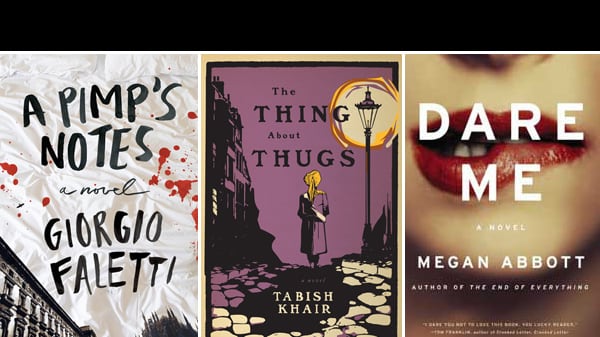Dare Me by Megan Abbot
A crime novelist tackles high-school cheerleading in an ode to the dark side of girlhood friendship and all its twisted loyalties.

Teenage friendship—the electric, combustible kind—is the focus of crime novelist Megan Abbott’s latest book, Dare Me, a heady tale of high-school drama with grown-up stakes. For 16-year-old Addy Hanlon, there are really only two things that matter in the world: Cheerleading and her best friend, Beth. Cheer is a sorority, an identity, a way of life, and wise-cracking, trouble-making, bad-ass cheer captain Beth is Addy’s fearless leader and partner in crime. But the arrival of a new coach for the cheer squad disrupts Addy and Beth’s insouciant reign over their peers. Young, pretty, petite, and commanding, Coach French demands toughness: bleacher runs, drills, sweat, hustle, discipline. Addy is immediately enamored of her new coach, whose drive gives Addy new strength and focus, and the moments Coach lets down her guard to share in her adult-infused brand of girlie camaraderie are intoxicating. Beth, bursting with destructive teenage schemes, won’t be displaced that easily, however. When Coach French’s relationship with Sergeant Will, a handsome military recruiter who is a fixture at the school, becomes the focus of a homicide investigation, Beth sees her chance to act. “Beth is almost always lying about something,” Addy observes, “but the lying is her way of rendering something else, something tucked away or confounded, manifest.” And so Addy wonders, at every turn: Does Beth know something she doesn’t? Abbott’s rendering of the power-plays, rites of bonding and twisted loyalties of teenage girls is pitch-perfect. As much as Dare Me is page-turning murder mystery, it is also an ode to the dark side of girlhood friendship.
The Thing About Thugs by Tabish Khair
When a series of beheadings terrorizes Victorian London, it falls on a confessed former member of a bloodthirsty Indian "Thuggee" cult and his friends to find the real killer.

A gang of killers is on the loose in Victorian London, taking the lives—and the severed heads—of the city’s lowlife. The press spins tales of cannibalism to further terrorize the public, never suspecting the gang’s real motive is money. The killers collect skulls because they are paid handsomely for their work. Their patron is the wealthy Lord Batterstone, a high-society phrenologist obsessed with expanding his anatomical collection. But the newspapers turn the public’s attention toward Amir Ali, a confessed former member of the bloodthirsty Indian Thuggee cult. Ali has been making the rounds in London social circles as the pet project of a man named Captain William Meadows. In reality, Amir is nothing more than an unlucky farmer’s son who saw self-mythologizing as a ticket out of unfortunate circumstances. Now Ali’s exotic tales of murder have caught up with him, and he is out of luck once again. Running out of options, Ali and his fellow second-class immigrants decide to hunt down the man behind the killings themselves. It’s easy to see why The Thing About Thugs was short-listed for the Man Asian Literary Prize. Crafted through layers of narrative (third and first-person observations from a variety of characters are interspersed with love letters, passages from Captain Meadows’s Notes on a Thug, and newspaper clippings), the story both mimics and upends the conventions of a Victorian novel. Author Tabish Khair also gives voice to a class of Londoner underrepresented in 19th-century-British literature: The voice of the forgotten, the marginalized, the misunderstood, and unknown.
A Pimp’s Notes by Giorgio Faletti
A castrated pimp becomes the prime suspect in a high-profile murder in this portrait of corruption among Milan’s elite in the late 1970s.

Faletti’s cunningly plotted story of power and corruption among Italy’s elite unfolds in late 1970s Milan. “I don’t gamble or play cards, so I don’t win and I don’t lose,” says the novel’s castrated narrator, a man known only as Bravo. In some ways, Bravo is a normal man of simple tastes, most at home trading word puzzles with his blind neighbor over a strong cup of coffee. But Bravo is not entirely immune to the seduction of beautiful women or the pleasures of risk taking. He makes a living supplying Milan’s wealthiest men with high-end prostitutes. The arrival of the enchanting Carla, however, changes everything. Bravo, for the first time, is attracted to one of his own employees. At the same time, he finds himself drawn deeper into Milan’s underworld, bargaining with mafia bosses, coordinating secret deliveries, and dodging bullets. When three of Bravo’s most-sought-after girls are killed in a major attack on the villa of his best client, suspicion falls on their pimp, and Bravo must find the real killer. The truth has to do with the man he was before he became Bravo, and the nightmarish mutilation that changed his life many years ago. Faletti’s Milan is convincingly shadowy, and full of surprises. In this thrillingly cinematic noir, no one is quite what they seem.
In the Shadow of the Banyanby Vaddey Ratner
A 7-year-old Cambodian princess struggles to understand the brutalities of the Khmer Rouge and the loss of her father after her family is displaced from Phnom Penh.

Based on the true story of author Vaddey Ratner’s childhood, In the Shadow of the Banyan depicts the atrocities of the Khmer Rouge from the eyes of a young Cambodian princess. Seven-year-old Raami, a polio survivor, is a bookish dreamer; when the Revolutionary Army takes Phnom Penh, she has just settled down in the family garden to read her illustrated version of the Reamker, a Cambodian adaptation of the Hindu Ramayana. But even before she can reach the point, early in the epic, where the noble prince Preah Ream is exiled, soldiers have stormed her home to demand the family leave immediately. When Raami, her parents, sister, aunts, uncle and grandmother are relocated to a forested province outside the capital, the family’s royal lineage immediately becomes a tremendous liability. Promptly recognized as the prince, poet and scholar that he is, Raami’s father is left with little choice but to sacrifice himself to save his family. Though his departure ultimately saves his wife and daughter, it also marks the beginning of a series of tragedies that one by one claim the lives of all of Raami’s extended relatives. The losses weigh heavily on Raami and her mother, but they also steel their resolve to stay alive—and to remember who they are—despite the direness of their circumstances. The imaginative Raami turns within, summoning the parables, poems, dignity, humility, and wisdom of her father. “Raami shares my faith in people,” Ratner has said of her protagonist. “Perhaps the big difference is that she can articulate it, and in so doing, magnifies it even more. Her intuition becomes prescience.” In the end, this is the powerful story of how even the most brutal regime lacked the power of a father’s love for his daughter.
You & Me by Padgett Powell
What happens when nothing happens? The great American writer Padgett Powell re-imagines Waiting for Godot in the South.

“You are incoherent, almost,” one of the unnamed speakers in Padgett Powell’s You & Me blurts out at one point. It’s just one of many apt observations in this book of meandering dialogue. Echoing the stripped-down, conversation-driven absurdist approach of Waiting for Godot, Powell’s latest work features two dueling voices trading stories, reminiscences, and half-plotted theories about just about everything. Haircuts, malaria, Jayne Mansfield, literary theory, flying dogs, Juicy Fruit, Gila monsters, suicide, Crazy Horse, Joe DiMaggio, geopolitics, Lucille Ball—nothing is off limits. But nothing is all that important, either. As Powell put it in a recent interview, “They're really tame. I don't think they ever go to the store and get liquor. These are polite, tired old men.” As such, it’s hard to locate anything like a raison d'être from You & Me’s mishmash of epigrams, cultural references, and propositions—which, perhaps, is the point. Why can’t conversation, in all its sloppy humanity, be enough? “If we could sit in these chairs unperturbed while everything was taken and have nothing then around us but the air we breathe a thought or two, and our monkey chitchat, we would somehow be very superior,” one voice suggests. “I think you are having a monastery vision,” comes the reply. And then, the first again: “Maybe I am.”






